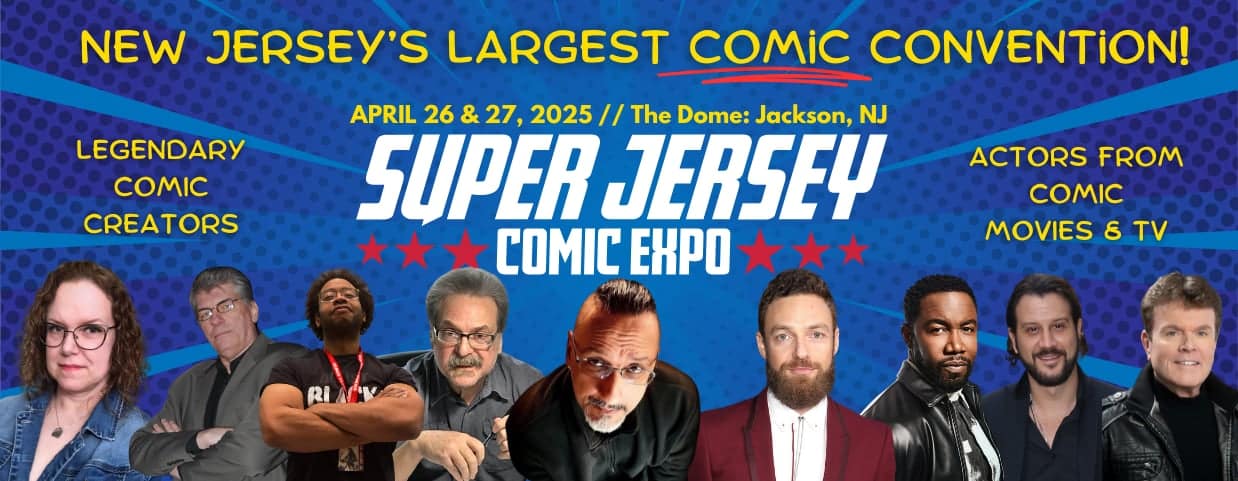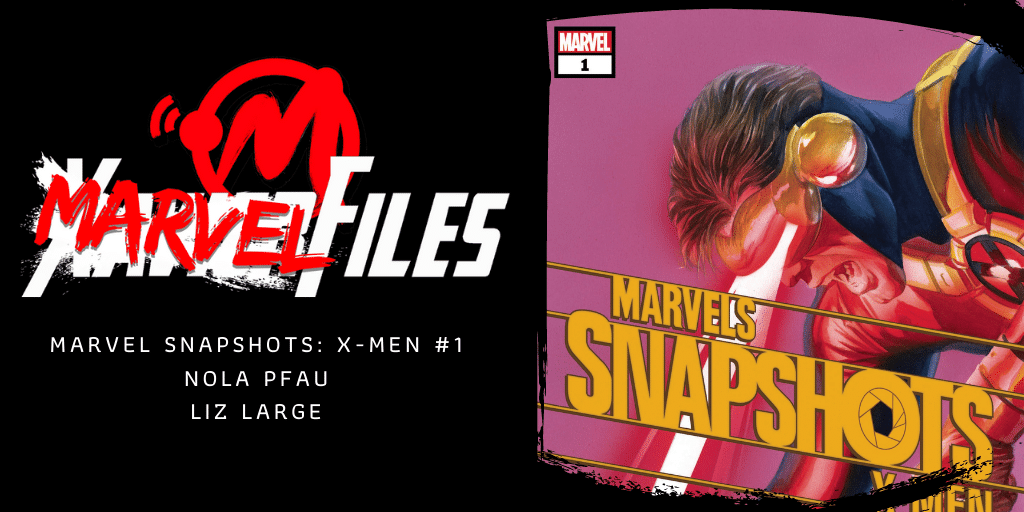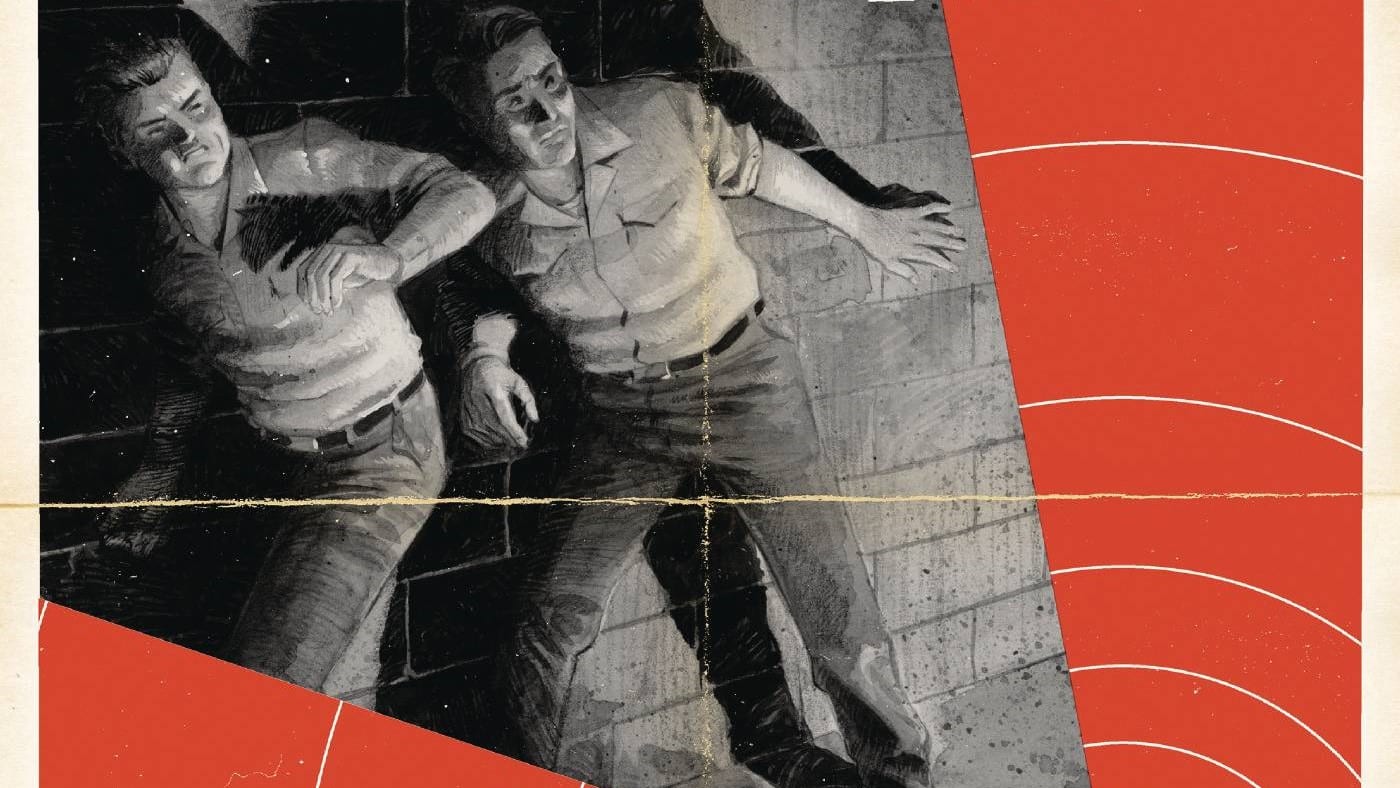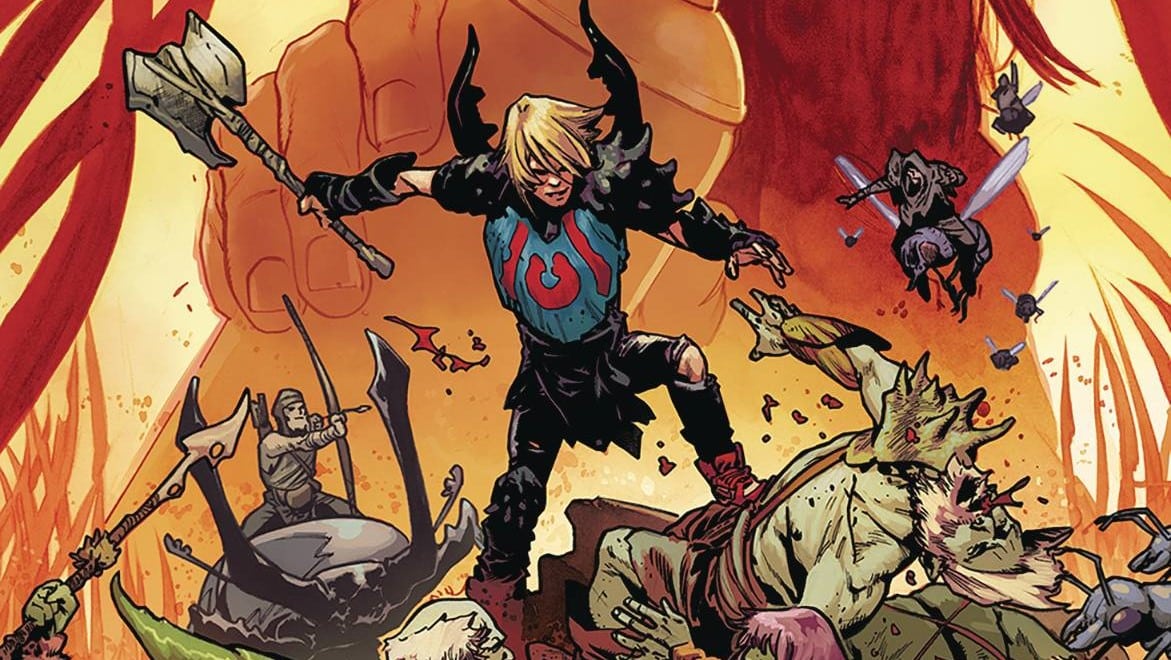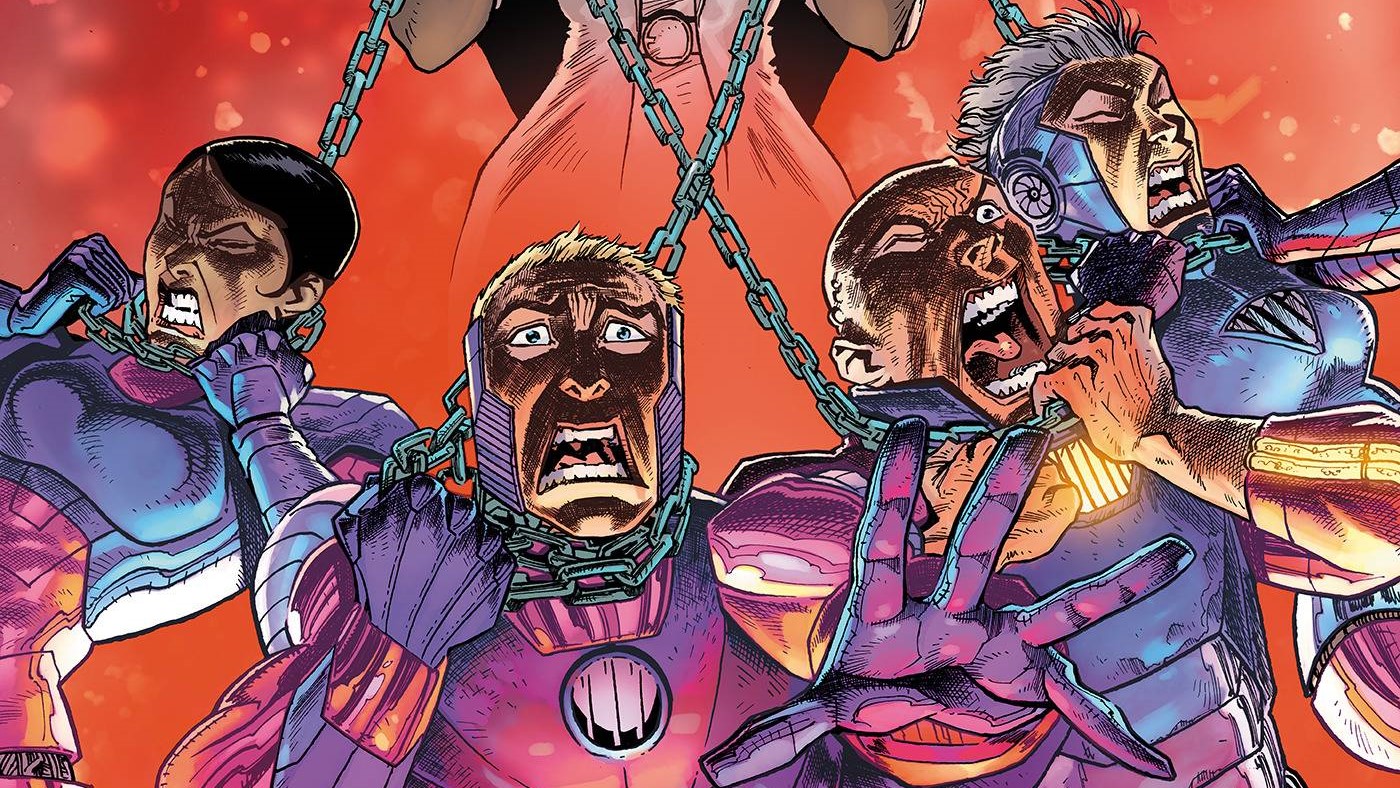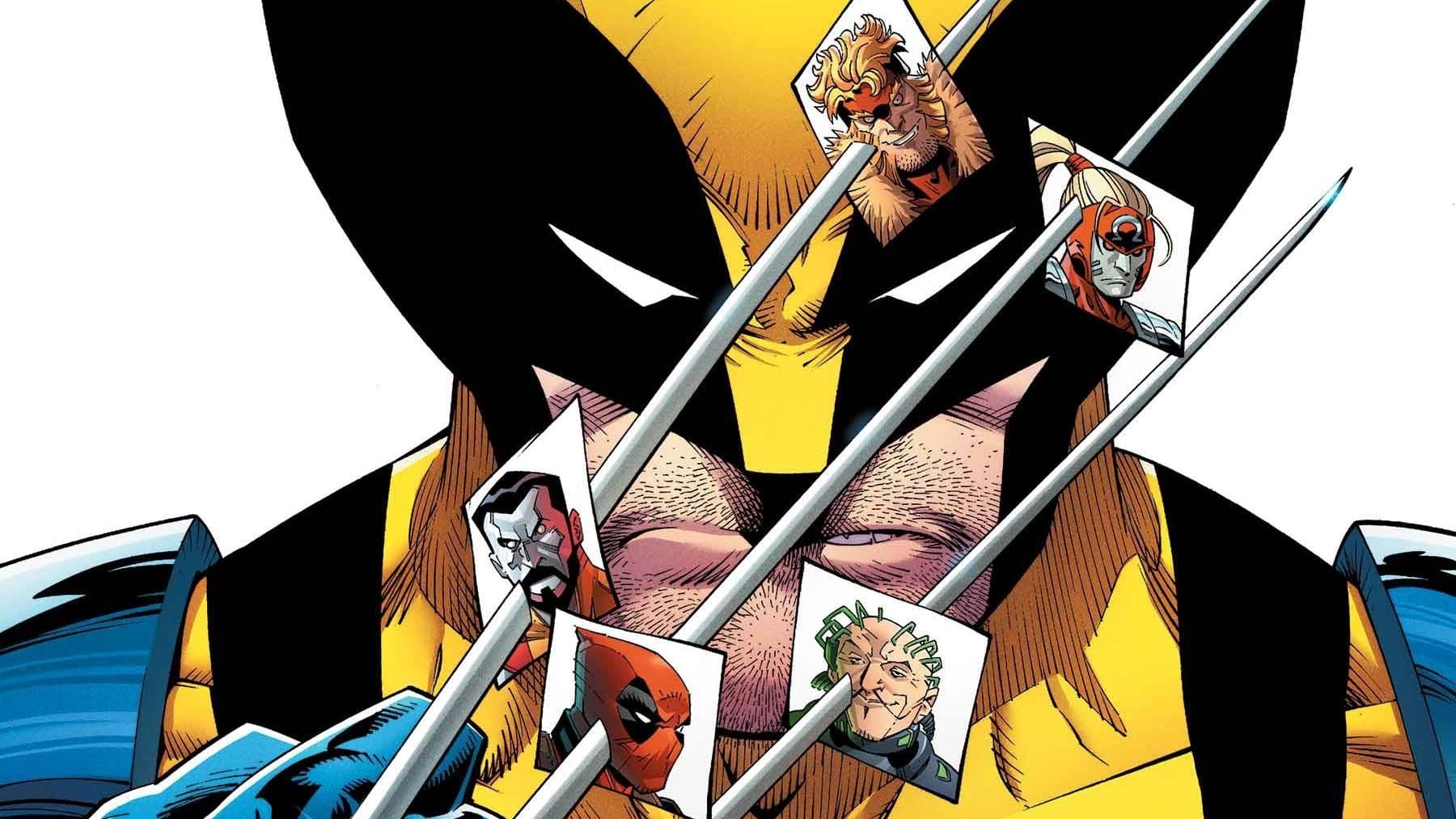In a special issue, Jay Edidin, Tom Riley, Chris O’Halloran, and Tom Orzechowski take us back to Cyclops’ childhood as he finds his place in Marvels Snapshots: X-Men #1
Nola Pfau: Liz! FINALLY OUR GREMLIN POWER COMBINES.
Liz Large: YES! I am extremely excited about this. Gremlin teamwork, activate! I am ready to take a deep dive into Cyclops, who absolutely has gremlin energy.
NP: It’s true, he’s definitely one of us. What do you think his favorite food crime is?
LL: I think eating a plain room temperature bagel is a very efficient breakfast, which seems like something he’d be into.
NP: The faster you eat, the more quickly you are prepared for when mutant supervillains attack you at 6:30 in the morning. Shall we dive in?
Hero Worship

LL: This story is primarily about Scott Summers’ childhood, but it ties in with the origin of the founding heroes of the Marvel universe– the Fantastic Four. While the X-Men and the FF are peers now (and sometimes enemies, when it comes to childcare), I often forget that the FF made a big public splash long before the X-Men were formed, and how that would impact a child seeing it
NP: Yeah. I really like this framing, first because of their current dynamics, but also because…I feel like most, if not every kid, encounters something during their preteen or teen years that is just…earth-shattering, paradigm-shifting. That can be music, art, or it can be world events. It absolutely makes sense in this case that it’s superheroes for Scott, and I feel like the way he latches onto the newness and the hope and the possibility of it is just…whew, it really worked for me.
LL: I absolutely agree. The issue begins with the plane crash that changed Scott’s life– four people in a cockpit, something going wrong– and the repetition of this scene to describe the FF’s origin works really well. It’s a comparison I never would have made on my own, but it just makes so much sense. Scott is fascinated with the new age of heroes, and while it’s clear that all the kids at the orphanage are, it’s easy to see that Scott’s obsessed– he’s reading the comic books and interviews, but he’s got the science magazines, and he’s going to the library to learn more. He’s pinning a lot on this, and I really feel for him.
NP: I do too, and what’s more, I really identify with it. I know what that kind of hyperfocus is like, I’ve been there. There’s this feeling sometimes with something like that where if you study enough, if you learn enough about a thing, that you might unlock something within yourself, some understanding about yourself and the way that you are. It can be difficult sometimes because the odds of that happening are maybe fifty-fifty at best, but folks succeed just enough that it always seems like it’s worth trying. Scott obsessively working to understand everything around him so that he can react appropriately has always been one of my favorite character traits of his here, and to see Jay use it to explain who he is as a character really affected me profoundly.
LL: I completely agree. I liked seeing that this is just who Scott is, that he’s always been this way. One of my favorite things about Scott is his preparation– giving back up plans numbers instead of letters, because you want more than 26, for example. I appreciate that this is all Scott, and not something that any of his mentors drilled into him.
The Man With the Plan(s)

NP: I think that’s a really good point—there is an initiative to Scott, a drive to do things that we see here, long before Xavier has had a chance to start molding him. It’s notable to me that when he sees the FF in action, the inspiration he takes from them is not about doing great things, being a hero, but doing the right thing. That’s another really defining imperative for the character, and it’s good to see the way it’s filtered through this story here. I say that the FF inspired him for instance, but he already has it; before he even sees them for the first time, he’s defending kids against bullies. I suppose it’s more accurate to say that witnessing the birth of superheroes in his world more reinforced that idea.
LL: That’s a really good point. Scott is unaware that he has any sort of superhuman powers, just debilitating headaches and memory loss. When he goes to see Reed Richards speak, he’s caught up in an attack by a supervillain–and he’s terrified. Scott’s a kid, caught between a collapsing building and a giant praying mantis, and ends up trapped beneath the rubble with a group of other civilians. Scott realizes that the rescuers won’t be able to hear them in the commotion, and risks his own life to climb up higher and reflect some light at the rescuers, attracting their attention. Without any powers or training, Scott realizes he can help people– and that he can be even better if he works on himself. It’s a big leap for a kid to make, and I love it.
NP: Yeah! It’s not “somebody save us,” it’s “I have to do something,” and it really sets him apart. I don’t think anyone is going to argue that Scott isn’t incredibly flawed as an adult, but to see this version of him, still trying to remember who he is, and doing his best to be a good person in spite of how demanding that kind of personal work can be, that’s a lot for a teen to take on. I love the way that, when his plan works, it’s still not enough. He’s still thinking about all of the what-ifs, the ways that situation could have gone instead, and that shows in the books he chooses on his own at the library afterward. Before the librarian recommends Sun Tzu, he comes to the counter with books on repair, navigation, emergency field medicine; he’s not just specializing in a STEM field like Reed or even Peter Parker. He’s going for a breadth of knowledge.
LL: Yes! He wants to know everything, and I think we all owe that librarian a debt of gratitude. I’ve never read The Art of War, but Scott repeatedly reading it, renewing it at the library, and taking notes is impressive. He is a child! Yes, he’s mature for his age, but the drive to get better is really something else. When he fights back against the bullies, he utilizes quotes from the book to help take him through it– up to a point. He’s got the knowledge, but he needs some experience to turn into the Cyclops we know today, which makes a lot of sense. Seeing him read one book and immediately defeat a group of bigger kids might have been satisfying, but I like that Scott has to work for it.
NP: Yeah, he’s read it three times by the point of that encounter, but it’s good to hammer home the point that just reading about tactics aren’t enough, you have to learn how to apply those. I’ve always thought of Scott, thematically, as the guy who sees all the angles. It’s intentional; his power is vision-based, as an adult he can do complex mathematical calculations in his head, and to see here the first steps to that, the first understandings of contextual application, that’s something I really, really enjoy. This, of course, leads to the first activation of his powers, and his running away (love that he’s so concerned about having accidentally stolen a library book), and his first decision to use his powers in a heroic context. I want to say it’s instinctive in him, and it is, but he doesn’t immediately follow the instinct; he does the calculations first, because he always does: Is the act of saving these lives worth what it will do to me, personally? His answer is yes. As it should be.
No Going Back

LL: I love the transition here: we see young Scott actively making the decision to be a hero, and cut to adult Scott. It’s the 90’s, and he’s leading the X-Men, coordinating a rescue mission between teams led by himself, Alex, and Cable, Dr. Peter Corbeau, and Reed Richards. Corbeau and Richards were both speaking that day he witnessed his first supervillain attack, and Alex was the brother he could almost remember. I love seeing how his life has changed. He’s now a peer of his heroes, he’s regained his family, and he’s started his own. Obviously, his life isn’t perfect, but the trajectory of how his personality and choices led him here is so clear.
NP: This, in context of Dawn of X, in context of his childhood, is…it’s a lot. Everyone enjoyed that little bit of Summers snark, when he paid Reed a visit in House Of X #1, but with the added history here, with him growing up and seeing Reed and the FF as idols, to being in a position to save Reed’s family, at a demonstrable risk to his life, to the lives of his entire team. There’s not even a need to see the calculations here; they’ve been done, and it’s worth it. It puts a lot of weight to their interactions elsewhere. When he shows up to offer Franklin a place on Krakoa, he’s not just being antagonistic, he’s standing there saying “I have, over and over again, demonstrated how much I am willing to risk for your children, for the future,” and god that’s powerful, especially given who he got the lesson from in the first place.
LL: Absolutely. I know Scott’s not perfect, but he is always, always trying to do what he thinks is right, especially at the risk of himself. This has always been what the X-Men do, as a team, but seeing Scott develop this ethos on his own is wonderful. Cyclops is a character who we’ve seen a lot of, and there’s a line to walk here. This could have ended up retreading things we’ve already seen, or coming up with some retcon that doesn’t fit right. Jay fits this story in perfectly– it’s completely consistent with everything we already know about Scott, but it adds a depth and sense of history here that we didn’t have before.
NP: As a personal lover of all things Cyclops, I really do not think I could’ve been more satisfied with this issue. I talked earlier about that need to learn and to understand, and how it doesn’t always pay off, and Jay manages to bring that home here too; Scott talks about the belief that you just do what’s right, and the rest will follow. Reed asks him if that’s true, and he says it clearly: Not always, but we keep trying. Liz, this issue made me cry. Multiple times. It might be one of my favorite comic books ever.
LL: It’s definitely a top-tier book. Scott’s opening monologue– about how “maybe I died and just didn’t notice” caused me physical pain. Scott’s journey here is really beautiful.
An awkward segue but: speaking of beautiful, I really love the art in this. I’m a sucker for the older style coloring and line art that Tom Reilly and Chris O’Halloran are doing here, especially the contrast of Scott’s normal, low-color life with the vibrant tones used whenever there’s something related to superheroes. It’s like the Wizard of Oz, except, you know, emotionally devastating.
NP: Yeah! Reilly is right up there with folks like Samnee and Aja stylistically, with that emphasis on line weight and a certain classic, square-jawed characterization. It’s really satisfying stuff to take in, and you’re right about O’halloran’s color work, both the contrast and the specific shades of blue used in those non-heroic moments. They’re not just washed out but they’re also a direct answer to that vibrant red of his powers; warm and cool tones, intensity of presence against a kind of quiet background existence. The kind that leads to a kid wondering if maybe he died and just didn’t notice.
X-Traneous Thoughts

- Jay has obviously been a big part of the X-Men community and has specifically helped some of us here at Xavier Files. We’re being as objective as we can, just giving you the disclosure heads up. It’s what Jay would want.
- I love that Super Doctor Astronaut Peter Corbeau appears in this issue not once, but twice.
- Super Doctor Astronaut Peter Corbeau having a cameo is maybe the most Jay thing possible aside from an appearance of ZZ-105, which frankly would’ve been very difficult to work in.
- Great synergy this week, with two comics featuring Summers brothers at the Nebraska State Home for Foundlings.
- Oh my god I didn’t even REALIZE that. And now they’ve both blown holes in it!
- A family tradition! I now need a flashback where Corsair accidentally crashes a spaceship into it in the 80s.
- I appreciate that in his obsessive quest for knowledge after witnessing the Fantastic Four, Scott gets copies of both SCIENCE and POPULAR SCIENCE magazines. He studies up on even the science no one likes.

